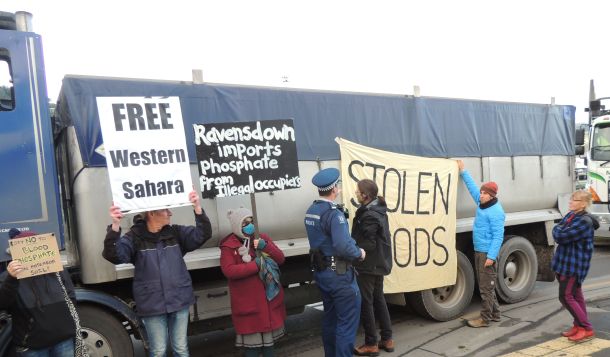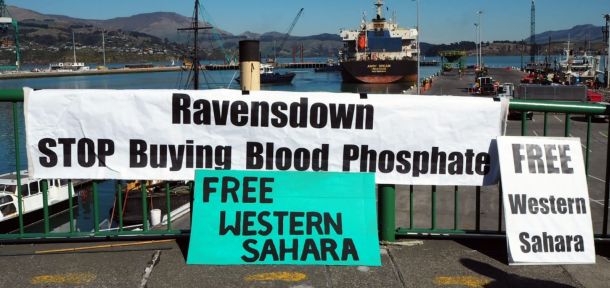Ravensdown Ltd
292 Main South Road
Hornby
Christchurch, 8042
New Zealand
Brussels
22 February 2018
To the attention of Mr Greg S. Campbell
Chief Executive Officer of Ravensdown Ltd
Re. Ravensdown Ltd’s 2017 imports of phosphate rock from Western Sahara
Dear Mr Campbell,
We have the honour to present you with our compliments. We are writing to seek comments from Ravensdown Ltd with regard to its 2017 imports from Western Sahara.
In the coming weeks, WSRW will publish its annual “P for Plunder” report, documenting the phosphate trade from Western Sahara during the previous calendar year. As Ravensdown will be featured in that report, we would be grateful for your answers and comments to the questions included below.
According to our calculations, an estimated 110,000 tonnes of phosphate rock from Western Sahara was received by Ravensdown in 2017, worth approximately US$ 9.7 million.
As stated in our previous letters to you, it is our firm conviction that it is not in the interest of Ravensdown to be associated with the trade of a conflict mineral from the last colony in Africa, that is subject of a UN-led peace process. That the trade is very controversial, has been exemplified by the case of the NM Cherry Blossom, a bulk carrier transporting 55,000 tonnes of rock from Western Sahara to Bluff, New Zealand, that had been purchased by another farmers cooperative from New Zealand - notably for a price equaling around 15% of the value of the annual multilateral humanitarian aid given to refugees from Western Sahara who fled their homeland after Morocco’s invasion. As you know, at the instigation of the Western Sahara government in exile, the vessel was detained in South Africa in May 2017 in order for the South African High Court to assess ownership of the cargo. The Moroccan state-owned phosphate company OCP announced in July 2017 to drop its defense in the legal proceeding. To date, the cargo remains aboard the vessel in Port Elizabeth.
The NM Cherry Blossom case underscores the issue of ownership over the phosphate rock of Western Sahara, and that Morocco’s claims to the phosphate mine in the Non-Self-Governing-Territory are unfounded. The legal, political and ethical questions emanating from Morocco’s continued exploitation of the mine, have come to the attention of ethically oriented investors worldwide. Among other factors, it is the continued exposure of the involved companies and pressure from investors that have resulted in a significant decrease in the number of firms importing phosphate rock from Western Sahara over the past few years.
You will have taken note that another major importer of Western Saharan phosphate rock, Nutrien Ltd (the merger of Agrium Inc and Potash Corporation Saskatchewan Ltd) has recently stated its intention to stop importing into Canada in 2018, and that it is also looking at phasing out options for the remaining imports into the USA, where it uses the rock for a specialty product. If Nutrien is to follow through, that would leave the New Zealand farmers as the only remaining importer in the world – that is not directly tied to Morocco’s state-owned phosphate company OCP – of the contentious rock.
In addition, the European Union has recently taken measures to limit the cadmium-rate in phosphate-based fertilizers. The EU Commission has released concerning reports on the health hazards linked to high levels of cadmium in those fertilizers. By 2030, phosphate rock from Morocco (and Western Sahara) will no longer be allowed in the EU single market, as the cadmium level of phosphate rock in North Africa in general is much higher than the allowed ratio. We expect the end-use consumers in New Zealand will be aware of this.
We would be grateful if you would answer the following questions:
1. Can you confirm that Ravensdown has purchased 110,000 tonnes of phosphate rock from Western Sahara during the year 2017?
2. What has your company done to obtain the express consent of the people of Western Sahara to the imports of phosphate rock from their country?
3. How does Ravensdown consider the risk of a negative public image of New Zealand’s agriculture industry, given that it may soon be the only client in the world of the Moroccan government’s exports from the occupied territory?
4. Has Ravensdown communicated the levels of carcinogenic elements in the imported rock to the end-users?
We think it is in your interest to review your company’s purchases from Western Sahara and halt all further imports. It is astounding to observe that the trade in Western Sahara phosphate rock is evolving into a situation where the main responsibles for providing Morocco with income of its continued and illegal occupation of part of its neighbouring country, are not stock-registered companies but rather New Zealand based farmer cooperatives, such as Ravensdown. We sincerely hope you will reconsider.
Best regards,
Sara Eyckmans
Coordinator
Western Sahara Resource Watch
coordinator@wsrw.org
A copy of this letter was sent to:
- Prime Minister of New Zealand, Ms Jacinda Ardern
- UN Special Representative for Western Sahara and Head of UN Mission for the Referendum in Western Sahara, Mr Colin Stewart
- Personal Envoy of the UN Secretary General for Western Sahara, Mr Horst Köhler
These are the clients of Morocco’s phosphate plunder
For the eleventh year in a row, Western Sahara Resource Watch publishes a detailed, annual overview of the companies involved in the purchase of conflict phosphates from occupied Western Sahara.
Protesters set up roadblock to stop conflict minerals in New Zealand
The pressure is mounting on the New Zealand importers of phosphate rock from occupied Western Sahara. Today protesters in Christchurch erected roadblocks to stop trucks from transporting the conflict minerals into the local Ravensdown fertiliser factory.
Kiwi importers ignore government advice on Western Sahara
While other companies internationally have managed to find alternative sources of phosphate - and in spite of a request of the New Zealand government that they do the same - the Kiwi fertilizer industry seems unwilling to drop its imports from occupied Western Sahara.
Flotilla targets phosphate plunder ship
A Japanese-Canadian vessel that transported conflict phosphate from occupied Western Sahara was yesterday received by a floating protest in New Zealand.


